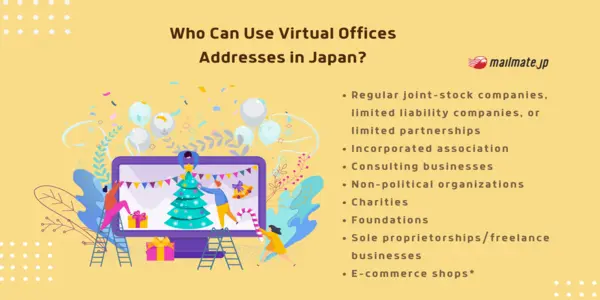Are Virtual Offices Legal? 9 Industries That Can’t Use Them

Using a virtual office to start your business is easy and much cheaper than renting a physical office space.
For most businesses, using a virtual address to register for your business is not illegal. However, in certain cases, business industries have conflicting regulations that prevent using virtual office addresses in Japan.
Today, we’re looking at who can and cannot use virtual addresses and regulatory concepts in Japan that often hinder their use.
First off, we start with the good news:
Who can use virtual offices addresses in Japan?
A general understanding of current regulation allows businesses in Japan to use a virtual office address on their touki (company registration with the Legal Affairs Bureau).
Here is a quick list of who can use virtual office addresses in Japan:
Regular joint-stock companies, limited liability companies, or limited partnerships
Incorporated association
Consulting businesses
Non-political organizations
Charities
Foundations
Sole proprietorships/freelance businesses
E-commerce shops*
*E-commerce shops can use virtual office addresses under certain conditions and parameters, which we’ll cover in detail in a separate article.
As you can see, using a virtual office address in Japan will be fine for most user cases.
Planning on starting a business in Japan and want to use a virtual office address? MailMate offers reliable and cost-effective virtual office solutions.
If you’re wondering “Are virtual offices legal?” MailMate can help answer the question for you. Sign up, hope on a demo call, and see how MailMate can help your business thrive in Japan.
However, there are exceptions and limitations, which we’ll discuss next.
Are virtual offices legal? 4 restrictions using a virtual office in Japan
Companies that can register as a corporation with a virtual office are those in industries that do not require permits or licenses to operate.
But if your business requires authorization, a license, or a lease contract, you’ll likely be dealing with one of the regulatory concepts listed here.
1. Requirement for physical business space
Within Japan’s regulations, the term to watch for that often rules out virtual office address use is as follows: 「物理的に業務可能なスペース」= “a physical space available for business operations”—which typically requires showing a rental lease contract as proof.
2. License display mandates:
Additionally, industries that require licensing + the display of one’s license in one’s office are also seen as “no-go zones”—because they necessitate actual physical space to display one’s license in a visible location to customers. (E.g., applies to financial business operators, certain legal professions, detectives, etc.)
3. Independent office space requirement
Another term that should signal caution is 「独立した営業所があること」 = “independent office space”—a phrase frequently used when describing offices that must have their own entrance, which is to ensure security measures for customer privacy. You may be asked to submit the office floor plan in your lease contract to determine this factor. (E.g., applies to staffing agencies, real estate agencies, certain legal professions, etc.)
4. Residency restrictions for virtual addresses:
We get asked this a lot, so we’re including it here: Virtual offices in Japan cannot be used on visa paperwork to list a person’s place of residence because immigration wants to know where the person will be residing vs. working.
Under the same logic, one cannot use a virtual address for any type of official paperwork that asks you to list your place of residence. For example, you can’t use a virtual address for your My Number card, driver’s license, or other application forms, and you need to tell the government where you live.
Those are the basics. But you should also know that interpreting Japan’s regulations is tricky—even for Japanese business owners. Legal counsel will occasionally present differing interpretations. (If you have a particular case in mind, do reach out and ask!)
To play it safe, we’re erring on the side of caution in this article.
9 businesses that can not use a virtual office address in Japan
According to a widely accepted understanding of regulations, here are the businesses that should forego virtual office addresses:
Note: The information here cannot substitute for legal counsel.
1. Certain legal professions 士業
Accountants, scriveners, lawyers, and other professions that end with 「士 」.
These professions require registration with governing bodies, such as the Japan Tax Accountants Association, the Japan Judicial Scriveners Association, or the Japan Bar Association, etc.
Most of these professions are required to show proof of physical space along with proof of independent office space to ensure client privacy. Lawyers, in particular, have many regulations that govern their physical office space, which conflict with the “virtual office space” concept.
2. Construction businesses 建設業
Companies in the construction industry must have a physical office address to obtain necessary licenses and registrations, including signage where one can tell from the outside that it is engaged in construction.
Although the approval standards differ from prefecture to prefecture, virtual offices for businesses in this industry cannot be used for paperwork related to opening or running a construction business in Japan.
3. Detective agencies 探偵業
When starting a detective business, you must notify the police and receive a "detective business license" from the Public Safety Commission. You are then to post this license in a conspicuous place in your office.
Since detective work is a type of business that may infringe on the rights of others (such as privacy), the government manages detective agencies. It ensures that clients do not hire detectives without a license.
Private detective agencies are prohibited from using virtual office addresses because they need to be transparent and accountable in their operations.
4. Financial business operators 金融商品取引業者
Financial business operators (investment management, investment advisory or agency business, or any other investment-related business) must be registered. They must present a Financial Instruments Business Operator Registration Card at their place of business/office.
In addition, you must declare the location where you plan to display the card and provide a drawing of the office and staff assignments. Some financial bureaus may require a copy of the lease agreement.
For these reasons, legal advisors generally state that virtual addresses do not comply with regulations governing finance business operators' offices.
5. Real estate businesses 不動産業
Real estate businesses must obtain a real estate transaction license at the time of opening.
As part of the licensing requirements, you must show a lease contract for your office. The real estate office from which you do business must be highly independent from other offices that might share the same building or floor (this independence is often marked by having its own entryway).
Therefore, virtual and shared offices are generally unacceptable for real estate use.
6. Secondhand goods/recycling shops 古物商
If you want to open a secondhand or recycle store, you must have a secondhand dealer's license and an independent business location where relevant parties can meet with you in person and where you can be reached should problems with your goods arise.
After applying for a secondhand dealer's permit, the business office may be physically inspected during the examination to prove its independence from other entities.
For these reasons, virtual offices and virtual addresses are risky for dealership paperwork.
7. Temporary staffing businesses and job placement businesses 人材派遣業/職業紹介業
When conducting a fee-based job placement business, you must obtain a license from the Minister of Health, Labor, and Welfare through the Prefectural Labor Bureau.
Part of the conditions of getting a license relates to specifics regarding office space, private interview space, and independent physical space—not shared with other companies, etc.
So, generally speaking, many Japanese lawyers who advise on this topic say virtual offices for placement agencies are a no.
8. Waste disposal collection 廃棄物処理業
Technically, there is no “rule” that prohibits the use of listing virtual office addresses on paperwork.
However, many prefectures also require you to register a parking lot when you receive your permit, so the needs of a waste disposal business owner are often not satisfied with virtual office addresses.
9. Adult entertainment (cabaret clubs, pubs, pachinko parlors, etc.) 風俗営業
This industry category refers to businesses that require an adult entertainment business license, such as pachinko parlors, cabaret clubs, bars, etc.
Because this industry has, up until now, pertained to physical places of congregation, there are very specific requirements regarding where such establishments are allowed to open for business (zoning laws) and regulations regarding building codes, which rule out virtual office addresses.
Can I use a virtual address for my business license?
Using a virtual address for your business license in Japan depends on your industry. Most businesses can use a virtual address in their business licenses.
However, industries requiring physical, independent space and licenses, such as legal professions and construction work, can not use virtual addresses due to specific requirements.
Can I use a virtual office for company registration?
Yes, you can use a virtual office for your company registration as part of the incorporation process in Japan.
Since a virtual office is a legitimate physical address in Japan, it is completely compliant with Japan’s Legal Affairs Bureau.
The virtual office address itself only provides the address, not a physical space. As such, certain business industries may not be able to use a virtual office address due to the nature of the work.
Frequently asked questions
Can I use an office space for company registration?
You can register your company in an office space in Japan. Physical office spaces can range from independent, private spaces to shared and serviced spaces.
Are virtual offices legal?
Virtual offices are legal and offer a cost-effective solution for businesses that don’t require a physical space. However, certain industries have specific regulatory requirements that make using a virtual office difficult. So check the industry-specific regulations to ensure you will be compliant.
Are virtual addresses legal?
Yes, virtual addresses are legal in Japan as they provide businesses a physical mailing address, but no physical space. MailMate’s virtual address can be used for company registration, mail receipt, and other official purposes.
Which businesses can not use a virtual office?
In general, certain legal professions, construction businesses, detective agencies, financial operators, second hand stores, temporary staffing business, waste disposal collections, and any adult entertainment can not use virtual office addresses.
In closing
Now that we’ve answered the question, “Are virtual offices legal?” Is your business ready to open to new opportunities in Japan?
Virtual offices offer flexibility and cost savings, though they can be heavily regulated in certain business industries in Japan. For industries with stringent regulatory requirements, having a physical office is beneficial and often mandatory.
But if your business industry does not need such requirements, then MailMate has your back as a virtual office address provider.
Spending too long figuring out your Japanese mail?
Virtual mail + translation services start at 3800 per month. 30-day money-back guarantee.

